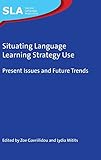Situating Language Learning Strategy Use : Present Issues and Future Trends / ed. by Zoe Gavriilidou, Lydia Mitits.
Material type: TextSeries: Second Language Acquisition ; 146Publisher: Bristol ; Blue Ridge Summit : Multilingual Matters, [2021]Copyright date: ©2021Description: 1 online resource (344 p.)Content type:
TextSeries: Second Language Acquisition ; 146Publisher: Bristol ; Blue Ridge Summit : Multilingual Matters, [2021]Copyright date: ©2021Description: 1 online resource (344 p.)Content type: - 9781788926713
- 9781788926720
- 418.0071 23
- P51 .S525 2021
- online - DeGruyter
| Item type | Current library | Call number | URL | Status | Notes | Barcode | |
|---|---|---|---|---|---|---|---|
 eBook
eBook
|
Biblioteca "Angelicum" Pont. Univ. S.Tommaso d'Aquino Nuvola online | online - DeGruyter (Browse shelf(Opens below)) | Online access | Not for loan (Accesso limitato) | Accesso per gli utenti autorizzati / Access for authorized users | (dgr)9781788926720 |
Frontmatter -- Contents -- Figures and Tables -- Contributors -- Foreword: Strategies for Sustainable Language Learning -- Preface -- Introduction -- Part 1: Language Learning Strategies: Where Do We Go from Here? -- 1 Language Learner Strategies: A Call for Fine-tuned Strategy Categorization -- 2 Consciously Keeping Watch: Self-regulation and Learning Strategies -- Part 2: New Pathways to Language Learning Strategy Research -- 3 Speaking Strategies and Speaking Ability in ESP Classrooms in a Higher Education Setting -- 4 Vocabulary Learning Strategy Surveys in Second Language Acquisition: Design, Context and Content -- 5 Exploring EFL Learners’ Paths through Vocabulary Learning Using Narrative Frames -- 6 The Language of the Home in Learning L2 Vocabulary -- 7 Strategic Construal of Particle Verbs (PVs) in Croatian Secondary School Learners of English -- Part 3: Language Learning Strategies in Context -- 8 Situating Language Learning Strategy Use and Instruction: The Greek Context -- 9 Task-specific Strategy Use in Video-mediated Integrated Writing: The Greek EAP Context -- 10 Understanding Language Learning Strategies in Context: The Case of Russian Students Learning Greek as a Foreign Language -- 11 EFL Learning Strategies and Motivational Orientations of Multilingual Learners in Mainstream and Dual-immersion Schools -- 12 Morphological Segmentation in Strategy-based Instruction: Towards a Graded Morphological Syllabus of Modern Greek -- 13 Promoting Learner Autonomy through Learning Strategy Instruction with College EFL Students -- 14 Promoting Learners’ Critical Thinking and Developing Reading Strategies through Critical Video-gaming -- 15 Using Digital Supportive Feedback for the Strategic Training of Young EFL Learners -- Appendix A: VLS Surveys -- Appendix B: A Completed and Coded Narrative Frame -- Appendix C: Class A Course Syllabus -- Appendix D: Class B Course Syllabus -- Appendix E: Unit 4 Lesson Plan -- Appendix F: Unit 4 Activities and Tasks -- Appendix G: Needs Analysis Questionnaire -- Appendix H: Sample Diary Entry -- Appendix I: Learner Beliefs Questionnaire -- Appendix J: Questionnaire and Vocabulary Tests -- Appendix K: Interactive Material -- Subject Index -- Author Index
restricted access online access with authorization star
http://purl.org/coar/access_right/c_16ec
This book presents the latest research on the role of strategy use and development in second and foreign language teaching and learning. It will equip scholars and practitioners with the knowledge to help them better appreciate how language learning strategies contribute to and are linked with language learning processes.
Mode of access: Internet via World Wide Web.
In English.
Description based on online resource; title from PDF title page (publisher's Web site, viewed 25. Jun 2024)


